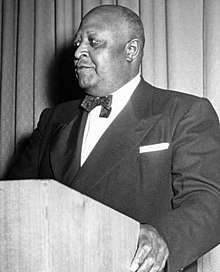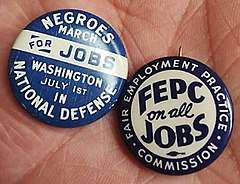Milton P. Webster
| Milton P. Webster | |
|---|---|
 Milton Webster in the 1940s | |
| Born |
April 23, 1881 Clarksville, Tennessee |
| Died | 1965 |
| Nationality | American |
| Known for | Brotherhood of Sleeping Car Porters |
Milton Price Webster (1881-1965) was an American trade unionist, best remembered as a top leader of the Brotherhood of Sleeping Car Porters (BSCP). As lead official of the union in the process of contract negotiations, Webster was influential in winning the first collective bargaining agreement with the Pullman Company — the first national contract won by any black-led American trade union.
During the years of World War II Webster was a member of the Fair Employment Practice Committee and its successor organization, attempting to end racial discrimination in the defense industry. Webster also later served as a member of the International Board of the American Federation of Labor.
Biography
Early years
Milton Price Webster was born on April 23, 1881 in Clarksville, Tennessee.[1] His father was a barber.[2]
Webster moved from Tennessee to the booming metropolis of Chicago as a young man and obtained work there as a Pullman porter, a job which he held for nearly 18 years.[2] He left the job in April 1924 following a dispute with an official of the Chicago & Northwestern Railroad, for which he worked.[1]
After leaving the railroad, Webster took a job as an assistant bailiff at the Chicago Municipal Court, later working for the Republican Party as a political functionary in that same city.[2]
Civil Rights work

On June 25, 1941 President Franklin D. Roosevelt signed Executive Order 8802, prohibiting racial discrimination in the defense industry and establishing the Fair Employment Practice Committee (FEPC).[3] Roosevelt was pushed into action by head of the BSCP A. Philip Randolph, who had been instrumental in organizing the March on Washington Movement (MOWM), which had planned to demonstrate in the nation's capital later in 1941 unless action to end racial discrimination was taken.
The National Committee of the March on Washington Movement, expecting that the FEPC would be largely involved with trade union affairs and thus needed an effective and experienced negotiator, selected Milton Webster as their nominee and he was duly appointed to the committee.[4] The FEPC would hold a series of public hearings on racial discrimination in Los Angeles, Chicago, New York City, and Birmingham, Alabama but suffered from a lack of support from the White House for perceived overreach in attempting to end racial discrimination across all government agencies.[5] In an effort to dodge potential racial conflict and its political ramifications, in July Roosevelt moved the FEPC from independent status under Presidential supervision to the direction of the War Manpower Commission, headed by Paul V. McNutt.[5]
Only through the concerted pressure of black leaders would Roosevelt be forced to return the committee to the Executive office from the War Department.[6] Roosevelt's signing of Executive Order 9346 in May 1943 restructured the FEPC as the President's Committee on Fair Employment (remembered to historians as the "Second President's Committee").[7] Webster's talent and worth in the position was recognized as he was the only person from the original FEPC retained on the 7-member committee following its 1943 reorganization.[5]
Footnotes
- 1 2 F.L. Simmons, "Memorandum to Mr. G. A. Kelly on Milton P. Webster, c. 1930s," Chicago: Newberry Library. Call number: Pullman Company Archives, 06-01-04 Box 17 Folder 454.
- 1 2 3 Jessie Carney Smith, "Milton P. Webster," Notable Black American Men, Book II. Farmington Hills, MI: Gale, 2006; pg. XX.
- ↑ Paula F. Pfeffer, A. Philip Randolph, Pioneer of the Civil Rights Movement. Baton Rouge, LA: Louisiana State University Press, 1990; pg. 89.
- ↑ Pfeffer, A. Philip Randolph, pp. 90-91.
- 1 2 3 Pfeffer, A. Philip Randolph, pg. 91.
- ↑ Pfeffer, A. Philip Randolph, pg. 92.
- ↑ Pfeffer, A. Philip Randolph, pg. 93.
Further reading
- Philip S. Foner, Organized Labor and the Black Worker,1619-1973. New York: Praeger Publishers, 1974.
- William H. Harris, Keeping the Faith: A. Philip Randolph, Milton P. Webster, and the Brotherhood of Sleeping Car Porters, 1925-37. Urbana, IL: University of Illinois Press, 1978.
- Greg LeRoy, "The Founding Heart of A. Philip Randolph's Union: Milton P. Webster and Chicago's Pullman Porters Organize, 1925–1937." Labor's Heritage, vol. 3 (July 1991), pp. 22-43.
- Paula F. Pfeffer, A. Philip Randolph, Pioneer of the Civil Rights Movement. Baton Rouge, LA: Louisiana State University Press, 1990.
- Larry Tye, Rising from the Rails: Pullman Porters and the Making of the Black Middle Class. New York: Henry Holt & Co., 2004.
- Joseph F. Wilson, Tearing Down the Color Bar: A Documentary History and Analysis of the Brotherhood of Sleeping Car Porters. New York: Columbia University Press, 1989.